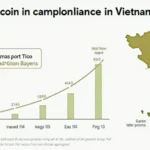Bitcoin Blockchain Energy Policies: The Future of Sustainable Finance
With Bitcoin mining consuming nearly 100TWh per year, the environmental impact of the blockchain is a hot topic in today’s financial discussions. How does Bitcoin’s energy consumption affect global energy policies, and what are the sustainable alternatives being explored? Let’s dive in.
The Energy Landscape of Bitcoin Blockchain
Bitcoin’s decentralized network relies heavily on miners who validate transactions through energy-intensive computations. As this demand grows, so too does the scrutiny from environmental advocates. According to Cambridge Centre for Alternative Finance, Bitcoin mining is equivalent to the annual energy consumption of countries like Argentina.
Various countries are now exploring energy policies to regulate or incentivize greener practices in the crypto mining sector:

- Renewable Energy Initiatives: Governments are incentivizing miners to relocate operations to areas with abundant renewable resources.
- Carbon Credits: Some policies encourage offsetting emissions through carbon credits for sustainable mining.
Global Perspectives on Bitcoin Energy Policies
Different regions have taken unique approaches towards Bitcoin energy policies. For instance, some nations, fueled by environmental concerns, have imposed restrictions on Bitcoin mining operations.
- China: In 2021, China cracked down on Bitcoin mining, citing excessive energy consumption.
- North America: The U.S. sees a rising popularity of Bitcoin mining powered by sustainable energy sources like hydro and wind.
Vietnam’s Unique Stance on Bitcoin Mining
Vietnam has become an emerging market in the crypto sphere, with a staggering 200% growth in active crypto users in the last year. The country is exploring its energy policies to accommodate the rise of Bitcoin mining.
Current discussions revolve around how to blend crypto innovation with environmental sustainability:
- Government Regulations: Plans for potential taxation on excess energy consumption for miners.
- Investment in Green Solutions: Encouraging investment in renewable sources for mining operations.
Thị trường Việt Nam vẫn còn nhiều tiềm năng cho việc áp dụng blockchain và tiền điện tử vào thực tế.
The Shift Towards Eco-Friendly Mining Solutions
In response to pressures from environmentalists and national policies, many companies are looking into eco-friendly mining solutions. Alternative methods include:
- Hydro-Powered Mining: By setting up operations near hydroelectric plants, miners can drastically reduce their carbon footprint.
- Solar Energy: Using solar energy is becoming prevalent in regions with abundant sunlight.
Case Study: Bitfury’s Solar Mining Project
Bitfury, a global leader in Bitcoin mining, has launched solar mining facilities across regions in Africa, where access to energy is limited while maximizing land use for energy generation.
Balancing Innovation with Responsibility
As Bitcoin continues to evolve, finding a balance between technological advancement and environmental responsibility is imperative. Governments, miners, and investors must consider:
- Encouraging transparency in energy consumption.
- Incentivizing use of renewable resources for mining operations.
- Exploring new consensus protocols that consume less energy, like Proof of Stake.
Being proactive in shaping effective energy policies not only enhances the legitimacy of Bitcoin but also promotes a sustainable blockchain ecosystem. This is vital for long-term adoption and the crypto economy’s growth.
Conclusion: The Future of Bitcoin Blockchain Energy Policies
Bitcoin blockchain energy policies are crucial as we advance towards a more sustainable future. With a balance of innovation, regulation, and renewable energy adaptation, Bitcoin mining can evolve to meet both consumer demands and environmental obligations. As we approach 2025, policymakers and stakeholders must work together to ensure the sustainability of digital currencies.
The transition is not just necessary; it’s inevitable. As we witness the repercussions of climate change and increased scrutiny on energy consumption in the finance sector, the call for responsible energy policies in Bitcoin mining will only grow louder.
For more insights on blockchain and cryptocurrency trends in Vietnam, check out our guide: Read our Vietnam crypto tax guide.
This article provides a foundational understanding of Bitcoin blockchain energy policies while also addressing the unique landscape present in Vietnam, where the market shows substantial growth potential.
Written by Dr. Jane Anderson, a blockchain researcher with over 10 years of experience in energy policies in cryptocurrency, and author of multiple papers on innovative technologies and their regulatory impacts.





